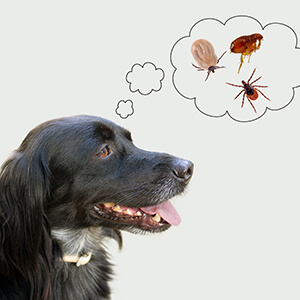Why protect your pets from heartworm, intestinal parasites, fleas, and ticks?
Heartworm Prevention and Heartworm Tests
While Heartworm prevention is not a vaccination, it is equally important as a preventative that works against a potentially deadly disease. The disease is caused by a parasite (the Heartworm) and as the name suggests, it lives in the heart of its host. The heartworm parasite is transmitted by the annoying and ever present Mosquitoes and follows a life stage from micofilaria to larva, and then to adult where it continues to replicate. Heartworm prevention is done in conjunction with a Heartworm testing. Heartworm disease is preventable but requires a monthly treatment in the form of a pill plus an annual Heartworm Test to screen for the life stage as the medication is only potent during the early larval stage. Though dogs are more likely to succumb to the Heartworm disease, cats may also acquire the disease if only less frequently.
Intestinal Parasites Prevention
Intestinal parasites include tapeworm, roundworm, whipworm, hookworm, and others that live part or most of their life cycle inside the ingesting of its host. Parasite hosts are commonly pets (dogs, cats, etc), however, people may also contract a parasite infection. Transmission of parasites between people has been reduced by proper hygiene, sanitation, and dressing, especially footwear in lieu of walking bare feet. Pets on the other hand, ingest/eat things they are not suppose to including picking up rotting carrion if owners aren't paying attention. Dogs and cats sniff and lick each other in various areas. Dogs rub themselves on smelly items on the ground while going for a walk. Dogs filter through the garbage every chance they get. All these reasons are why it is very likely for your pet to contract a parasitic worm. In conjunction with intestinal parasite prevention, a fecal test or fecal analysis is done to search for any existing intestinal parasite (ova, adult) in which case treatment is needed to kill and decontaminate before going on preventive medication.
Flea Prevention/Treatment
While attracted to pets, fleas may also bite people and prove to be a true pest that may infest your entire home. Both pets and people may also have allergic reactions to flea bites in addition to the uncomfortable crawling and itchy feeling. Fleas are also carriers of tapeworm and can transmit it to dogs and cats as they become new hosts.
Tick Prevention/Treatment
Ticks are bigger than fleas and they also may do more damage because they are vectors for several zoonotic diseases that cause severe illness in people. These zoonotic diseases include: Lyme disease, Rocky Mountain Spotted Fever, Babesiosis, Ehrlichiosis, Hepatozoonosis, and Anaplasmosis. There are also different species of ticks that are common in different areas and have different levels of regional persistence: Western Black Leg Tick, Lone Star Tick, Gulf Coast Tick, American Dog Tick, and Brown Dog Tick.

